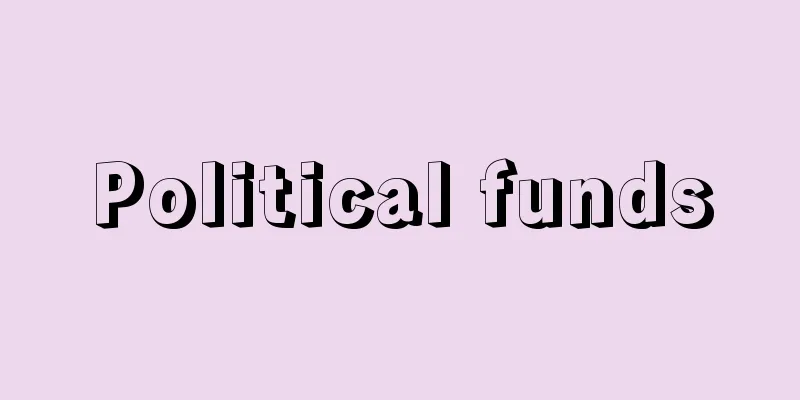Political funds

|
Funds necessary for individuals (politicians), political organizations, and political parties to carry out political activities. Political funds are complex and diverse, including election funds, the costs of founding political parties and political organizations, the costs of collecting various information to draft policies and turn them into bills, the costs of taking measures in the Diet to pass bills, the costs of promoting the opinions and policies of politicians, political organizations, and political parties, and the costs of all political activities, including contact with voters. These political funds should be covered by funds such as membership fees and party dues contributed by sponsors, members of political organizations, and members of political parties. However, in Japan, people have little interest in politics, and the custom of voluntarily contributing political funds as members of political organizations or party members has not taken root, and donations from organizations such as companies and labor unions account for the majority of political funds. After World War II, along with the rapid economic growth, the amount of donations to individual politicians, factions, political parties, etc. continued to increase year by year. In particular, political funding (political donations) from companies and organizations is said to be often intended to provide special benefits in return for political activity to the companies or organizations making the donations, or the industries to which they belong, and regulation of this has been a long-standing issue. [Tetsuro Murofushi] Political Funds Control ActIn order to prevent political corruption involving political funds, the Political Funds Control Law was enacted in Japan in 1948 (Showa 23). This law required political parties and other political organizations that received political donations to keep accounting books and submit itemized statements of political income and expenditures by source every year to the Election Management Commission or the Ministry of Home Affairs at the time. However, immediately after the shipbuilding scandal (1954), Prime Minister Yoshida Shigeru remarked that "it is only natural that the contents of political party accounting books are inaccurate," providing circumstantial evidence that this law was a "sieve law." [Tetsuro Murofushi] Amendment to the Political Funds Control Law Since then, Japan's legislative, executive and judicial systems, where the change of government between the ruling and opposition parties has not functioned normally, have always postponed legislative measures to strictly clean up political funds. However, the Recruit Scandal (1988-1989), which was uncovered for concealing political funding by using preferred stock allocations by companies, and the tax evasion scandal (1992) of Kanemaru Shin (1914-1996), a top official in the ruling party, became an opportunity to expose the dark side of political funding by companies and organizations. During the administrations of Hosokawa Morihiro and Murayama Tomiichi from 1993 to 1994, when the ruling and opposition parties temporarily changed sides, efforts were made to strengthen political funding regulations, and in 1994 the Political Funds Control Law was significantly revised, limiting donations by companies and organizations to political parties, political funding organizations and fund management organizations, and lowering the disclosure threshold for donations. Furthermore, based on the idea of shifting the flow of political funds from individuals to political parties, the Political Party Subsidy Law was enacted, which is a new public funding system (political party subsidy system) that provides political funds to political parties from the national budget. The Political Party Subsidy Law states: The Political Funds Control Act has since been amended to include a ban on corporate and organizational donations to fund management organizations, restrictions on fund management organizations' acquisition of real estate, and a requirement for political organizations related to members of the Diet to disclose all receipts, etc. However, it is said that there are various methods for illegally raising political funds that slip through the narrow sieve of the Political Funds Control Act. The "overt" or "underground" political funds raised are tax-exempt, and in addition to being used for legitimate political activities, they are often wasted on buying voting rights, buying the voting rights of lawmakers, maintaining the power or factional affiliations of specific politicians, or on the personal assets and personal use of individual politicians, but the current political funds control laws are not sufficient to fully grasp the actual situation. In addition, there is an item called "membership fees" that accounts for a large proportion of political activity expenditures in politicians' electoral districts, but these are donations to senior citizens' associations, women's associations, children's associations, etc. Since "donations" are prohibited under the Public Offices Election Act, they are called "membership fees." [Tetsuro Murofushi] Future challengesThe Political Funds Control Law requires reporting of political fund receipts and expenditures to the Ministry of Internal Affairs and Communications, but it is said that the reports to the Ministry are only the tip of the iceberg when it comes to actual political funds. Furthermore, in Japan, most political funds are not used for policy-making or legislative activities, but are instead used for constituency strategies aimed at winning the next election, excessive office expenses for socializing, and personnel costs. To eradicate today's voters' distrust of politics and politicians, a more transparent explanation of the flow of political fund receipts and expenditures is the bare minimum necessary, and it is also essential to eradicate the structure of voters' extortion of politicians. [Tetsuro Murofushi] [References] | | | | | | | | |Source: Shogakukan Encyclopedia Nipponica About Encyclopedia Nipponica Information | Legend |
|
個人(政治家)、政治団体、政党が政治活動を行うために必要な資金。政治資金の内容は、選挙資金をはじめ、政党・政治団体の結成、組織維持運営に要する費用、各種情報を収集して政策を立案・法案化する作業のための資金、法案成立のための国会対策を講ずる資金、政治家や政治団体、政党の意見や政策をPRする資金、さらには、選挙民との接触を含めたすべての政治活動上必要とする資金など複雑多岐にわたる。こうした政治資金は、本来は、後援者や政治団体の会員、政党の党員などの拠出する会費や党費のような資金によってまかなわれるべきである。しかし、日本では、国民の政治に対する関心が薄く、自発的に政治団体の会員や党員として政治資金を拠出する習慣はなかなか根づかず、企業や労働組合などの団体による寄付金が大部分を占めている。第二次世界大戦後、経済の高度成長とともに、政治家個人、派閥、政党などへの寄付額は年々増え続けた。とくに企業・団体からの政治資金提供(政治献金)は、それら寄付行為の主体である企業・団体またはそれらが属する業界に対して、政治活動を通した特段の利益の見返り供与を目的とするものが多いとされ、その規制は長年の懸案であった。 [室伏哲郎] 政治資金規正法政治資金をめぐる政治的腐敗を防止するため、日本では1948年(昭和23)に政治資金規正法が制定された。同法は、政治資金の寄付を受ける政党その他の政治団体に対し、会計帳簿を設け、政治資金の収入・支出につき出所別項目別明細書を毎年選挙管理委員会または当時の自治省に届け出る義務を課していた。しかし、造船疑獄(1954)直後、吉田茂首相は「政党の帳簿の内容が不正確であることは当然」と放言して、この法律の「ざる法」であることを「傍証」してみせたのであった。 [室伏哲郎] 政治資金規正法改正その後も、与野党政権交代が正常に機能しない日本の立法・行政・司法組織は、つねに政治資金の厳しい浄化に関する立法措置を先送りしてきた。しかし、政治資金供与を企業の優先株割当方式で隠蔽(いんぺい)して摘発されたリクルート事件(1988~1989)や政府与党の最高幹部金丸信(かねまるしん)(1914―1996)議員の脱税事件(1992)などは、企業・団体の政治資金の暗部を暴く契機となった。一時的に与野党の交替が行われた1993年(平成5)から1994年の細川護熙(もりひろ)内閣、村山富市(とみいち)内閣の時代に政治資金規正強化が図られ、1994年には、企業・団体による寄付を、政党、政治資金団体、資金管理団体に対するものに限ること、献金の公開基準額を引き下げることなど、政治資金規正法の大幅な改正が行われた。さらに、政治資金の流れを個人から政党中心へという理念に基づき、新たに国家の予算から政党に政治資金を供与する公費助成制度(政党助成制度)である政党助成法が制定された。政党助成法では、 政治資金規正法は、その後、資金管理団体への企業・団体献金禁止、資金管理団体による不動産取得等の制限、国会議員関係政治団体に対するすべての領収書等公開の義務づけなどの改正が行われている。 しかし、政治資金規正法の粗いざるの目をくぐった脱法政治資金集めには、さまざまな方法があるといわれている。集められた「表」もしくは「裏」の政治資金は非課税であり、正当な政治活動のほかに、選挙権の買収、議員の表決権の買収、特定の政治家個人の権力や派閥軍団維持、あるいは政治家個人の私財・私用などのために浪費されることも少なくないというが、現行の政治資金規正の法律では十分な実態把握には至らない。また、政治家の選挙区に対する政治活動支出で大きな比重を占める「会費」という項目があるが、これは老人会・婦人会・子供会などに対する寄付である。公職選挙法では「寄付」が禁じられているため、会費という名目になっている。 [室伏哲郎] 今後の課題政治資金規正法は、政治資金の収支について総務省への報告を義務づけているが、総務省報告は実際の政治資金の氷山の一角であるともいわれる。また、日本では政治資金のほとんどが政策づくりや立法活動のために使われるのではなく、次回選挙の当選を狙(ねら)う選挙区対策やつきあいのための過大な事務所経費、人件費などにあてられているのが実態である。今日の有権者の政治不信、政治家不信を一掃するには、政治資金収支の流れについて、より透明な解明が必要最低限の条件であるとともに、政治家に対する選挙民の「タカリ」の構造を根絶することも不可欠であろう。 [室伏哲郎] [参照項目] | | | | | | | | |出典 小学館 日本大百科全書(ニッポニカ)日本大百科全書(ニッポニカ)について 情報 | 凡例 |
Recommend
Treaty of Mersen
In 870, the East and West Frankish kingdoms concl...
Milwaukee
Wisconsin is the largest city in the state, locat...
Onamuchi no Kami - God of Great Muchi
…This refers to a series of myths set mainly in t...
Eleocharis wichurai (English spelling) Eleochariswichurai
…[Tetsuo Koyama]. … *Some of the terminology that...
Masuda Nagamori
Year of death: May 27, 1615 (June 23, 1615) Year o...
Clothoid - Kurosoid (English spelling)
A type of plane curve. It is also called the Corn...
Rotating model - Rotating model
...This model was first proposed by J. Rainwater,...
Inba [village] - Inba
A village in Inban County, northwestern Chiba Pref...
Shimada Seijiro
Novelist. Born in Ishikawa Prefecture. Dropped ou...
Candolle, APde (English spelling) CandolleAPde
…AL de Jussieu classified the plant kingdom into ...
Paganism - Ikyo
〘noun〙① A teaching or religion that is different f...
Ogata Koan
A Dutch medical scholar in the late Edo period. B...
Plain paper copy
...there are two methods: the indirect method (PP...
Takauji Ashikaga
A military commander during the Northern and Sout...
alētheia (English spelling) aletheia
...This view of truth is a new way of thinking th...









